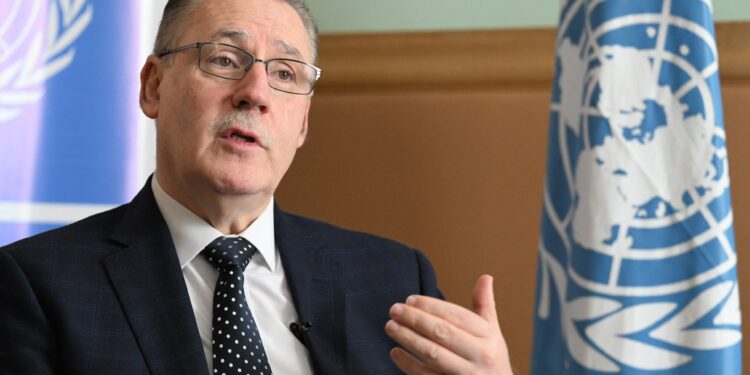The Assistant Secretary -General of the United Nations Development Program, Abdullah Al -Dardari, stressed the necessity of launching the process of economic recovery in Syria without waiting for the lifting of sanctions from them, calling for “quick results” that are reflected in the daily lives of Syrians.
The French Press Agency quoted Al -Dardari as saying on the sidelines of his visit to Damascus that the sanctions are one of the most prominent challenges facing the new authorities in the construction and reconstruction process after the overthrow of the Assad regime.
Al -Dardari said that the lifting of sanctions is “something we must work on, and at the same time we must start the process of economic recovery even in light of the sanctions.”
He added, “Waiting to lift the sanctions will not work, we must work in parallel,” he added, “When the clear plan and clear priorities are available, and when the financing sanctions are lifted, it will flow on Syria.”
The Syrian authorities, led by President Ahmed al -Shara, repeated the call to lift the sanctions imposed during the era of Bashar al -Assad, to revive the exhausted economy as a result of the conflict.
Some parties, including the United States and the European Union, have reduced some of these sanctions, but they have taken more steps to test the performance of the new authorities in several areas, such as fighting “terrorism” and protecting human rights and minorities.
A report issued by the United Nations program warned last February that in light of the current economic growth rates, Syria will not be able to restore the level of GDP for the pre -2011 revolution before the year 2080.
The International Organization estimated the total losses of GDP at about 800 billion dollars in about 14 years of the start of the revolution.
https://www.youtube.com/watch?v=spncqytq4k0
Poverty
The report highlighted that 9 out of 10 Syrians live today below the poverty line, and that one out of every 4 unemployed, while GDP decreased to less than half of its level in 2011.
The report also showed a decline in the human development index – which includes health, education and the standard of living – below its level in 1990, which is equivalent to more than 30 years of wasteful development progress due to war.
Al -Dardari said that “the major loss in the Syrian economy is the loss of the difference between what it should have been the Syrian economy in 2025 and where is it now.”
He continued, “The Syrian economy was supposed to reach a gross domestic product of about 125 billion dollars in 2025 compared to 62 billion in 2010, we today do not exceed 30 billion dollars in GDP.”
Fast results
Al -Dardari considered that the first stages of recovery are “the rapid achievements that the citizen feels, such as building a dispensary or opening a barber shop or a sports center.”
He warned that civil society should work to expand its activities to provide services to contribute with the authorities, and to improve government services quickly “in order for” the citizen to feel that the streets are cleaner, and the movement of cars and traffic is better “, especially in these difficult circumstances, as he put it.
The conflict in Syria killed more than half a million people and displaced millions.
The United Nations confirmed in early March that more than 900,000 displaced people inside Syria have returned to their homes since the overthrow of Assad on December 8.
Al -Dardari said that the “material destruction” that Syria was exposed to was very huge, and the largest part was “in the housing sector, 375,000 homes that were completely destroyed and more than 1.5 million homes were partially damaged.”
Reconstruction
Al -Dardari estimated the cost of rebuilding these houses at tens of billions of dollars, pointing out that in light of the decline in international development since the return of US President Donald Trump to the White House, “it is necessary to unite new and effective financing tools in order for the Syrians to be able to return to their homes and construction.”
It is scheduled to participate in a Syrian delegation that includes the ministers of the Foreign and Finance and the Central Bank of the Bank next week in the spring meetings of the World Bank Group and the International Monetary Fund in Washington.
A source of processing of meetings confirmed that the research will include how to keep pace with the reconstruction process and the advancement of the Syrian economy, a process that requires its achievement a “long path”.
https://www.youtube.com/watch?v=nse6l_kjp5u
Al -Dardari discussed in Damascus with Syrian officials cooperation between the government and the United Nations Development Program.
In response to a question about the change of the work of the program in Syria after the overthrow of the lion, the UN official said that during the war the priority for the work of humanitarian organizations, “Now we are in the front seat alongside the driver and his successor, and the driver is the government.”
Al -Dardari – the assistant director and director of the regional office of the Arab countries – stressed that the United Nations program has put a “energy plan and the future of energy in Syria”, and it provided about 30 million dollars to develop Deir Ali, south of Damascus, which is one of the most important electrical energy production plants in Syria.



